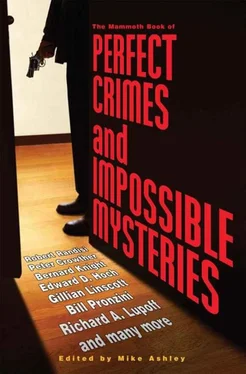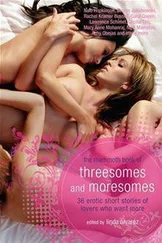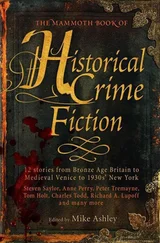“The loaded revolver he kept in his bedroom,” pursued Magnum, “is nothing out of the ordinary for a nervous man living in a lonely country cottage. But the wire screen is highly unusual. The unusual is worth analysis.”
An hour later, they were at Tonbridge. Mrs Pritchett was readily found in the parlour above her daughter’s confectionery shop in the High Street – a time-worn, grey-haired, grey-minded woman, resigned to the arrows of misfortune, dull of speech, with that love for irrelevant, side-track detail which goes so often with one of limited interests and narrow outlook. Magnum, with his impatience of slowness, found his temper distinctly tried during his endeavours to get relevant answers to his pointed questions. In essence, her information amounted to this:
Mr Jonasson had had the wire screen fixed up six months previously. He was a very reserved man, liking to give orders without giving reasons. It was in wintertime, so that there was no reason to guard against wasps, gnats, or mosquitoes. No; she had no idea why he wanted it, but he was very concerned about having it put up at once.
“At once?” questioned Magnum, seizing on the suggestiveness of the phrase.
It was directly after he received a visit from the dark gentleman with the gold-rimmed spectacles. High words had passed between them. No; she had no idea who he was. Mr Jonasson was very reserved, keeping his affairs entirely to himself. The dark gentleman was a foreigner – he looked like a half-caste. He was seen in the neighbourhood of Paddock Wood three months later. She believed that this man must have tried to murder Mr Jonasson in the train. She was convinced that he was hiding under the seat of the compartment.
“That has been proved impossible,” put in Stacey.
Mrs Pritchett was of the opinion that nothing was impossible to a foreigner.
Regarding the past life of the dead man, her information was mostly conjecture, embroidered fantastically after the fashion of country gossip. The only definite fact was that he had gone to Africa as a young man. The name “Uganda” persisted in her memory. At one time he had kept souvenirs of Africa in his study, but some years back he had made a clean sweep of them, burning them in a bonfire at the end of the garden.
Letters? When Mr Jonasson received letters, he usually burnt them. No, indeed, she never pried into his private papers! She hoped she knew her place! No; she didn’t listen to the conversation between Mr Jonasson and the foreigner. She couldn’t help hearing that they were angry with one another, but to suggest that she would stoop to listen at a keyhole-
“If you had,” retorted Magnum impatiently, “Mr Jonasson might be alive today.”
Mrs Pritchett relapsed into the easy tears of old age, and it took all Stacey’s efforts to comfort her.
“You’ll be saying next as it was me as murdered him!” she cried accusingly at Magnum.
He offered a sovereign as consolation for wounded feelings, and the interview proceeded. But no further information of importance resulted.
Magnum and Stacey returned to town. The scientist chose an empty second-class compartment of the same type as the mystery carriage, and asked Stacey to leave him there alone during the journey.
At Cannon Street, when Stacey went to rejoin his friend, he found Magnum glowing with excitement.
“I think we’ve got it!” he cried, slapping Stacey on the shoulder with a lusty thump. “First set your detectives on the hunt for that half-caste with the gold-rimmed spectacles.”
“Yes, I’d settled to do that,” returned the young lawyer; “but even if we find him, it doesn’t help much for our side of the case. Assume that he threatened to murder Jonasson-assume that Jonasson was in deadly terror of him-assume that he travelled in the next compartment to Jonasson. Even then the Empire Company would claim that the deceased threw himself out of the train-suicide while temporarily insane, but still suicide. The fifty thousand pound policy money will never come to Miss Gerard unless we can show the court how Jonasson was terrified out of an empty compartment.”
“I believe I can do it,” returned Magnum emphatically. “The phial of atoxyl he carried in his pocket, the book on sleeping sickness, the wire screen to his bedroom window, Uganda the home of the tsetse fly – they fit together like the pieces of a jig-saw puzzle. One more piece in place, and the whole pattern would stand out. To-morrow we’ll search that sealed compartment once again.”
“In the presence of the Empire’s lawyer?”
“Naturally. Arrange it for the afternoon. And if I can show him that Magnum is not quite the fool he imagines-”
As mentioned before, Magnum was not without a dash of very human vanity.
On the following afternoon, the same four were back in the shed where the mystery carriage stood mutely waiting to deliver up its secret. The insurance lawyer’s acidulated smile was now fattened out to a mellow tolerance. He was no longer afraid of any of Magnum’s theories. The goods manager, while still outwardly neutral, had transferred his sympathies to the side of the Empire Company.
Although it was summer, Magnum wore a pair of thick gloves. In his side-pocket a packet bulged out noticeably.
“I want every inch of the compartment swept out,” he said to the railway official. “Will you do it yourself, so as to avoid any suspicion that might arise if I were to do so?”
Tolerantly, the goods manager called for a carriage-cleaner’s broom, and proceeded to the task, sweeping around the cornices, behind the cushions, and underneath the seats, and gathering the sweepings into a small pile, while the other three watched intently from outside.
“Stop!” called Magnum suddenly, his eyes alight with unsuppressed triumph. From the sweepings he picked up a large insect, dead, and displayed it emphatically in his gloved hand in front of the insurance lawyer.
“A tsetse fly!” he stated.
“Well; and what if it is?”
“The carrier of the sleeping sickness. Deadly. One sting from it, and a man would stand a poor chance.”
“I don’t follow your argument,” objected the lawyer, with chilly impassiveness.
“That’s what drove Jonasson to his death. That one, and perhaps a dozen others. The rest probably flew out of the open door in the Sevenoaks tunnel. This one was killed by him.”
“Still, I don’t follow you. How could your dozen tsetse flies enter a closed compartment?”
“Get inside, and I’ll demonstrate!” snapped Magnum.
The lawyer, with a gesture of disbelief, entered the compartment, and the door was closed on him. Magnum immediately proceeded to the smoking compartment alongside, lit himself a cigar, and then produced from his pocket the box which was causing the bulge. It contained a dozen live wasps, angry at their long imprisonment. Magnum, standing on a seat, took out one of the buzzing insects with his heavily gloved fingers, and placed it in the tube of the alarm-chain passing from compartment to compartment. A few puffs from his cigar drove the insect to find escape through the further end of the tube. The other wasps quickly followed.
What then took place in the insurance lawyer’s compartment would have been highly comic had it not been in demonstration of a tragedy.
Fighting with the furious insects, ruffled, dishevelled, and wiped clear of cynical smiles, the lawyer made a hurried and undignified escape to the outside.
“And that,” clinched Magnum, “was how Jonasson was sent to his death.”
The murderer was never captured, and so the inner history of the tragic feud never came to light. But it became abundantly clear that the dead man had been fearing an attack by the tsetse fly; it was for that reason that he screened his bedroom window and carried in his pocket the drug which might counteract the terrible effects of the sting. No doubt the unknown murderer had threatened him with that particular form of revenge. Jonasson had insured his life heavily, either in the superstitious hope that it might avert death, or in order to leave his niece well provided for, or for both reasons.
Читать дальше











